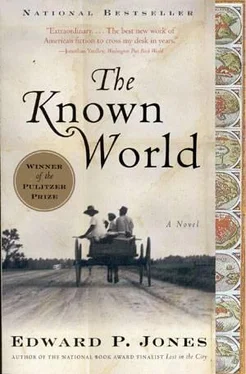“My house is big enough for me and my family is about all I can put in it. I told you you could call me John,” Skiffington said.
“Yes yes. John, like me is a John, heh?” Broussard had planned to use his share of the money from the sale of Moses and Bessie to bring his wife and children over. After an evening of drinking, he and Jorgensen had fought on the porch of the boardinghouse where they were staying and the Swede had ended up dead.
The jail door opened and William Robbins walked in, followed by Henry Townsend, who was then twenty years old. Henry was a little more than a year from buying Moses, nearly three years from marrying Caldonia. More than half of his time was spent at Robbins’s plantation, in a cabin separate from the slave quarters. He was a free man, a bootmaker and shoemaker, coming and going as he pleased, as long as he took his free papers with him.
“John,” Robbins said. He reached across the desk and shook Skiffington’s hand. The handshake was complete before Skiffington had fully risen.
“Bill.”
“Good day,” Broussard said, though he didn’t know Robbins.
“John, we had a little nasty business with Henry here. Harvey Travis gave him bad treatment not two nights ago when he was leaving my place. He hit Henry once and might have done more if Barnum Kinsey hadn’t stepped in to take Henry’s side. Bad business. John, very bad business. Henry was only headin to his folks.”
Henry had not moved from the door.
“Good day, Monsieur Bill.” Broussard was at the bars, as he had been since Skiffington entered.
Robbins turned around. “It was Travis, right?” he asked Henry. “Yessir.” “Travis,” Robbins said to Skiffington.
“I just saw him Saturday, Bill. Saw Harvey on Saturday.”
“About this here business?”
“No, another matter,” Skiffington said. “I’ll see him again this evening before the patrol. I’ll speak to him.” He knew of Henry, the boot and shoe Negro, had spoken a few times to him over the years. Skiffington and Winifred and Minerva would be at Henry’s funeral. As he looked at Henry standing at the door, Skiffington recalled that he was the son of the furniture maker Augustus and the woman Mildred who, at the far end of the county, might as well be at the end of the world.
Broussard and Jorgensen had gotten the name of William Robbins from Colfax, and it was slowly occurring to Broussard that this was the man Colfax had said might be interested in purchasing Moses and Bessie. “Monsieur. Monsieur Bill, please a moment. Three moment.”
“What?” Robbins said.
“Please, we have slaves for you. Two good humans for you.”
Skiffington explained.
“I didn’t come here for no damn slaves,” Robbins said to Broussard. He had heard about the Frenchman who had killed his own partner.
“Please. Please. I want to bring my wife and babies here and be America.”
Skiffington and Robbins looked at each other and then Skiffington shrugged. Robbins looked for one second at Henry then said to Broussard, “Where is this property?”
“Sawyer has em back of his place, and what little money Broussard had for their upkeep is running out,” Skiffington said. “He gets to live here free but I don’t know what will become of them when the money runs out.”
Robbins turned to Henry. “Go tell Mr. Sawyer to bring the property here, and tell him I want to get home before dinner.”
“Yessir,” Henry said and left.
“Good humans. The finer of the slaves,” Broussard said.
“Plain ‘finer’ ain’t good enough,” Robbins said and turned from Skiffington and Broussard and looked out the window that faced the street. “Only the finest will get me out of the bed in the morning.”
“Then finest it will be, Monsieur Bill.”
Sawyer walked in the door first. He was a fat man and he was out of breath. Then came Moses who turned to help Bessie because there was something wrong with her foot. She was limping and winced with each step. They were without chains, him and her, but Sawyer was holding a pistol. Then came Henry who stayed at the door after everyone had walked into the room.
“See, see, Monsieur Bill. Finest humans.”
Moses and Bessie looked at Broussard, then at Skiffington and finally over to Robbins, who had watched them come down the street. He already knew the woman would not do. The injury may not have been permanent, but he saw a kind of unsettling tilt to her walk, as if God had leaned her body just a bit to the side when he made her and bid her walk leaning just to the left for the rest of her life. And he could see that she had been crying and it had nothing to do with the foot. That, the crying, was also a permanent condition, he had decided.
Robbins stepped to Moses. “Take them things off,” he said to Moses about the rags he was wearing. “Sir. Master Sir, this woman, her and me is together,” Moses said. “Do what I said,” Robbins said. In a moment Moses was naked. Robbins walked around him and after squeezing both his arms and legs and looking into his mouth, he said to Broussard, “How much?”
“Eight hundred dollars, Monsieur Bill.”
Robbins said, “When I ask you a plain and simple question, I expect no less than a plain and simple answer.” Henry shifted from one foot to the other. Broussard held tight to the bars.
Sawyer was still trying to catch his breath. He took out a rag and leaned against the wall. Skiffington had the only chair at his desk. He had been standing beside the desk, but now he took two steps and was in the chair. Sawyer wiped his face and the back of his neck. Skiffington picked up the list of questions. Now he would have to start all over again. Nature of the Alleged Crime. Are there witnesses to the alleged crime? Can such witnesses be believed?
“But, Monsieur Bill, they are finer human beings. Please, please, my beautiful wife is waiting.”
“Sir, I have never known your wife, beautiful or otherwise, and she has never known me.”
“Yes. Yes. Then seven hundred dollars, Monsieur Bill. And five hundred for the woman. Good prices. They come from Alexandria. You have heard of Alexandria. Alexandria, Virginia, has known for the humans it sells. Go to the Alexandria for the best humans to sell, people told me. Alexandria. Ancient like the Egypt.”
Skiffington wrote. Name of Alleged Victim or Victims. Name of Alleged Criminal or Criminals.
Robbins said to Bessie about her rags, “Take them things out.” Henry moved a half step back until the doorknob was in his back. “Please, Master Sir,” Moses said, “we together, her and me. Don’t pull us apart. We together.” It was true that he and Bessie had come from Alexandria, where they first met in a holding pen. And now, after two months, he could not stand the thought of being away from her. “Please, master sir, she and me be family.” Robbins ignored him. Bessie began crying again, and she went on crying as she disrobed. Robbins touched her the same as he had touched Moses. “Please…” Moses said. “If you say one more word to me,” Robbins said to Moses, “I will buy you just to take you out in the street and shoot you. Just one more word.”
Skiffington looked up from his papers. I arrest you for the murder of this nigger right in front of my eyes.
Robbins went to the bars and said to Broussard, “I will give you five hundred and twenty-five for the man and not a penny more. If you say anything but ‘Yes,’ I will leave.”
“Yes, Monsieur Bill. Yes.” Broussard took his hands from the bars and put them at his sides. “Yes, Monsieur.”
“What am I gonna do with the woman, Bill?” Sawyer said.
“I don’t know, Reese. I really don’t know.”
Where did the alleged crime occur? That was the easiest question of them all, and he wrote, “Manchester County, Virginia.” Date of the Alleged Crime . He had forgotten the exact day of the murder and would have to ask Broussard. He knew that way down on the list was a question about witnesses. He would have to ask Broussard about that as well.
Читать дальше












